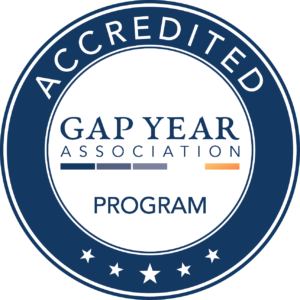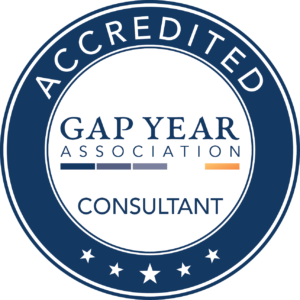GYA STANDARDS & ACCREDITATION
The Gap Year Association holds the official Standards Development Organization title for Gap Year Organizations in the United States as recognized by the U.S. Department of Justice and the U.S. Federal Trade Commission. In order to maintain GYA’s status as a Standards Development Organization (SDO), we are required to regularly update the standards to reflect broad representation of the gap year field. A wide variety of experts in gap year education, risk management, and other relevant fields contribute to the development of the Standards through participation in GYA’s Standards & Accreditation Committee.
GYA offers professional accreditation for GAP YEAR PROGRAMS and GAP YEAR CONSULTANTS.
ACCREDITATION FOR GAP YEAR PROGRAMS
 Gap Year Program Providers may start a GYA Accreditation Application if they are current GYA Program Members who have submitted a Program Accreditation Engagement Letter. Applicants complete a robust application, then undergo a two-part verification process that includes external reviews and student evaluations.
Gap Year Program Providers may start a GYA Accreditation Application if they are current GYA Program Members who have submitted a Program Accreditation Engagement Letter. Applicants complete a robust application, then undergo a two-part verification process that includes external reviews and student evaluations.
To maintain the integrity of the application process, we ensure that if a reviewer has a connection as a participant in a program or a professional affiliation with a program, they will be ineligible to participate in the review of that program’s application. Furthermore, GYA reviewers sign a Non-Disclosure Agreement in order to protect applicants’ intellectual property and proprietary information.
The typical timeline for successful program accreditation ranges from 8-14 months from the time an application is submitted. Full re-evaluation takes place every 4-5 years.
The scope of GYA’s program accreditation is limited to standards in gap year education as they pertain to organizational philosophy and professional ethics in the realm of experiential learning; principles of community-based learning; appropriate risk management policies and practices; facilitation of independent student experiences; and development of organizational partnerships.
GYA is not qualified to accredit programs with clinical therapeutic components. For therapeutic programs interested in pursuing professional accreditation, we recommend the following accrediting bodies (recommended by NATSAP):
- Association for Experiential Education (AEE)
- Commission on Accreditation of Rehabilitation Facilities (CARF)
- Council on Accreditation (CoA)
- DNV GL
- Joint Commission
- The Teaching Family Association
GYA's Program Standards Cover the Following Areas:
While every accreditation applicant must pass the first section of the Standards (“Philosophy & Professional Ethics”), the subsequent four sections may not be applicable to every organization. The applicant should determine which sections they will have to complete according to the types of experiences they provide on their programs.
Experiential pedagogical elements, staff training, financial responsibility, admissions, student supervision, insurance, incident reporting, etc.
This certification is one that every applicant organization will have to pass. Every organization that carries the GYA Seal of Accreditation has been vetted to ensure that they have a high degree of integrity such that their materials reflect the actuality of their programs, their staff (both office and non-office) function within excellent academic and ethical standards, and that they operate with honest and transparent communication. This section ensures integrity in pedagogy, financial responsibility, marketing, recruitment, clarity of program rules, documentation standards, admissions processes, student supervision, student insurance, staff training, labor rights and education (for staff and students), student-privacy (FERPA), mandatory incident reporting, abidance of all local laws, and cross-cultural awareness.
For organizations that incorporate service-learning into their program experiences. These standards hold organizations to the highest levels of ethics and integrity as they engage with their community partners.
Responsible service-learning, or volunteering with a focus on learning, presents complexities for all stakeholders, especially those traditionally-considered to receive service. Thus, a high degree of planning for common purposes and reciprocity in organizational partnerships, as well as agreed upon project longevity must be considered before, during, and after program activities. Gap year program providers must intentionally and critically consider potential positive and negative impacts on global and domestic communities in which they engage.
Typical activities that might count as volunteering or service-learning could be teaching, construction projects, or environmental projects.
GYA has partnered with the Community-Based Global Learning Collaborative in the development and implementation of GYA’s Fair Trade Learning standards.
Defined as standards around risk management in locations where emergency medical care is more than 2 hours away, and/or in other remote/under-resourced areas; medical kits, supervisory support and training, membership in OSAC; etc.
This certification is for organizations traveling 2 hours or more away from definitive and reliable medical care. Typically this will be applicable for overnight backpacking, or for those that work within non-industrialized countries or rural communities. This certification will specify additional provisions for supervisory staff, including medical training standards, communication requirements, and a well-stocked and sufficient medical kit with non-expired materials. For those organizations that function overseas, additional provisions including State Department Registration, and membership in the Overseas Security Advisory Council (OSAC) (or equivalent if based overseas), will be mandatory.
This section is relevant to organizations that integrate a more independent approach to student experiences within their programs. This section emphasizes adequate student preparation: regular communication, an adequate safety net to ensure proper student vetting, and proper internship and ground-supervisor vetting.
Organizations that outsource for homestays, language classes, SCUBA classes, treks, transportation companies, adventures activities, etc. are chief among those who will need to complete this section. In every case where a program outsources services or activities, simple checks will be required to ensure a clear and documentable understanding of who is responsible for what (e.g., equipment, medical staff, insurance), and to ensure that GYA’s Standards are upheld throughout all third-party partnerships. GYA encourages an emphasis on locally-owned, financially-responsible, culturally-sensitive, and environmentally-conscious partnerships.
ACCREDITATION FOR GAP YEAR CONSULTANTS
 In order to become a GYA Accredited Consultant, a consultant must demonstrate proficiency in the entire process of facilitating high-quality gap year referrals, including a history of working with at least 125 gap year students. Additionally, each Accredited Consultant must demonstrate care with student mentorship, program and placement vetting, intake forms, student support mechanisms, and a deep commitment to the field of gap year education.
In order to become a GYA Accredited Consultant, a consultant must demonstrate proficiency in the entire process of facilitating high-quality gap year referrals, including a history of working with at least 125 gap year students. Additionally, each Accredited Consultant must demonstrate care with student mentorship, program and placement vetting, intake forms, student support mechanisms, and a deep commitment to the field of gap year education.
Each individual consultant must pass the accreditation process to become an Accredited Gap Year Consultant, even if they work within an agency of other accredited consultants, in order to emphasize the importance of individual relationship-building with students and families. Upon accreditation, a gap year consultant is issued GYA’s Seal of Accreditation and offered a profile on GYA’s Accredited Consultant webpage.
GYA's Consultant Standards Cover the Following Areas:
This section ensures that the Gap Year Consultant understands core philosophical concepts of gap years and experiential education, and is committed to applying them while supporting students in their gap year planning and referral work with students.
These standards ask for evidence that:
- The Consultant’s pedagogy is congruent with gap year education.
- The Consultant’s marketing, enrollment, and “right-fit” materials are updated continually and made publicly available.
- The Consultant abides by GYA’s principles for student experience and safety.
This section ensures that a Consultant is effective at coaching students through the stewardship of relationships, continuous learning in Experiential Education, regular assessment of program sites, and intentional mentorship.
These standards ask for evidence that:
- Researching gap year experiences is at the center of the Gap Year Consultant’s work.
- The Consultant mentors students to structure their gap experience and remain engaged throughout the planning process.
This section recognizes that supporting students in planning and participating in their gap year activities requires careful and intentional preparation. This section specifically covers approaches to mentoring students pursuing Semi-Structured and Independent experiences. It is understood that the Consultant’s role in Structured programs can be limited to pre-departure support.
These standards ask for evidence that:
- The Consultant ensures appropriate preparation and support for Semi-Structured and Independent experiences.
- The Consultant encourages intentional and ethical service-learning and community engagement.
- The Consultant considers appropriate factors for independent international travel.
